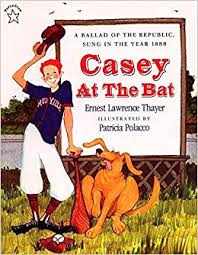Casey at the Bat
Listen to the Recess! Clip
| Author | Kevin Shortsleeve |
| Air Date | 6/4/2003 |

Casey at the Bat Transcript
Ernest Thayer did not start out as a baseball fan. He was most interested in pragmatic philosophy. Yet he had a humorous side and an ear for doggerel. And so he found himself editor of the Harvard Lampoon in the 1880s. There he met two friends on staff who would help shape his destiny in a most unlikely way. One was Sam Winslow, captain of the baseball team. Winslow’s nine went undefeated that year, and Thayer, for the first time, was stirred by the sport. His other pal on staff was William Randolph Hearst, the future newspaper tycoon. After college, Hearst offered Thayer a job writing for the San Francisco Examiner.
Inspired by the popular Bab Ballads, Casey at the Bat was one of many pieces Thayer turned out while on staff at the Examiner. It first appeared in print June 3, 1888, and Thayer received for it his customary payment of five dollars. Later that same summer, a comedian named De Wolfe Hopper was handed a copy of poem a friend had cut out of the paper. Hopper was engaged to perform that evening for the New York Baseball Club. He quickly memorized the piece and performed it on stage. The appreciative audience was lifted out of their seats. This was August 14, 1888, coincidentally Ernest Thayer’s 25th birthday.
Casey became Hopper’s signature piece, and he claimed to have performed it no less than 15,000 times. He even starred in a 1916 silent film version of the poem. In 1955, William Shuman composed an opera, The Mighty Casey, for CBS Television. And since the early 1900s, the poem has been reprinted many times in book form.
Recently released from Handprint Books is a fascinating new version illustrated by Christopher Bing. This unique volume presents the Casey poem as a series of headlines from a fictitious antique local newspaper. Whatever version you have, Thayer’s attempt to capture the exhilaration of a bases loaded, one-swing-left drama, connects deeply with the sports fan who doesn’t know if he or she will be incited to leap with joy or groan in despair. Celebrating a loser, Casey at the Bat has always appeared an original and surprising composition. A dark ending – a failed hero – pride demolished – it reads not unlike some tongue-in-cheek, all-American tragedy.
“Somewhere men are laughing, and somewhere children shout;
But there is no joy in Mudville – Mighty Casey has struck out.”